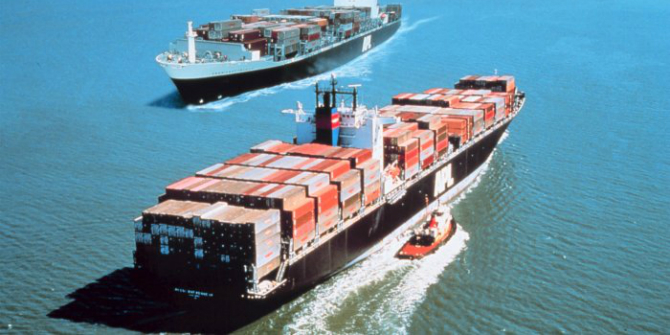The Irish Sea is an important link in EU supply chains. Andrew Potter explains that a hard border between the UK and Ireland would make journeys lengthier and may push some trade away from Welsh ports altogether. Around 11,000 local jobs depend on these ports.
Whilst much discussion around trade in the post-Brexit UK focuses on the agreements between the UK and elsewhere, at an operational level ports across the UK and in Wales are already gearing up to deal with the likely outcomes. With 95% of UK trade by volume passing through a port, the potential implications are significant.
In the context of Wales, ports handled 55.5 million tonnes of freight in 2015, and around 11,000 jobs in Wales are in ports or related industries. The majority of the freight handled is general cargo, such as oil products, iron ore or finished steel. The remainder is ‘unitised’ in either containers or a trailer. It is this ‘unitised’ traffic that is particularly likely to be affected by changes resulting from Brexit. The reason for this is that much of this traffic goes between the UK and Ireland, and includes retail and manufacturing goods. However, there are also flows to mainland Europe using the UK effectively as a bridge. From a Welsh perspective, this freight uses Holyhead, Pembroke or Fishguard to cross the Irish Sea to reach other parts of the EU.
The UK–Ireland border
Although not yet determined, a ‘hard’ border existing on UK to Ireland ferry services would have significant impact on how ports operate and potentially a disproportionate impact on Wales’ ports. Until now, within the European Single Market, ports have streamlined their operations to minimise the time spent at the terminal. Often, this has also meant building new infrastructure such as passenger facilities, their location reflecting these changed operations. Reintroducing checks will require some reconfiguration to provide space for vehicles to queue, to avoid congestion on port approach roads.

A ‘hard’ border would potentially make Welsh ports less attractive that their English or European counterparts. Currently, the north Wales port of Holyhead is attractive for many supply chains as it offers the quickest end-to-end journey times and allows drivers to accompany vehicles to Ireland. A ‘hard’ border would increase delays, and it may be more cost and time effective for a trailer to travel without a driver on the sea leg, for which Liverpool becomes a more attractive option.
For the west Wales ports of Pembroke and Fishguard, traffic heading to or from mainland Europe may find the direct crossings from Western France to Ireland more attractive, especially as they would avoid two EU entry/exit points.
A ‘soft’ border only between the Republic of Ireland and Northern Ireland would further harm the competitiveness of Welsh ports. The existing service between Liverpool and Belfast already offers a degree of competition but, if fewer checks existed due to the ‘soft’ border, then more traffic may use this route instead. A direct Holyhead to Belfast service would not offer an improved journey time.
Dealing with a ‘hard’ border
So, what can be done in the event of a ‘hard’ border between the UK and Ireland? There has been much talk about a multi-agency IT system to speed up information flows and improve transit times. However, while such systems are used in places like Rotterdam, delivering this by 2019 is challenging.
The supply chain could help by signing up to the Approved Economic Operator scheme. Similar to the ‘green channel’ at an airport, where members of the supply chain effectively self-certify the products in a sealed trailer, this would reduce the number of checks needed. However, few firms currently have this certification, largely due to errors in completing the application forms rather than having the appropriate security facilities. Beyond issues around the UK-Ireland border, Welsh ports also face challenges from other aspects of Brexit such as changes to import and export products and destinations due to trade agreements tariffs and future industrial strategies. The applicability of EU Regulations needs clarity, especially for those such as the Port Services Regulations that are due to be fully enacted in 2019, potentially weeks before Brexit becomes reality.
However, perhaps the one issue that could have the biggest impact here in Wales is whether the border with Ireland is ‘hard’ or ‘soft’. If ‘hard’, traffic may well migrate to non-Welsh ports unless ports, the supply chains they form part of, and government agencies take steps to reduce the potential delays.
Recently, the National Assembly for Wales’ External Affairs and Additional Legislation Committee has been investigating the potential impact of Brexit on Welsh ports, to which Andrew Potter was invited to give evidence. The Committee’s report can be read in full here.
This post represents the views of the author and not those of the Brexit blog, nor the LSE. It first appeared at the Welsh Brexit Blog.
Dr Andrew Potter is a Reader in Transport and Logistics and a member of the Logistics and Operations Management Section in Cardiff Business School.








We love the EU because we personally and institutionally benefit from membership in the form of grants,expenses subsidies and other ways and means(specially commissioned and usually unneeded research projects for example) and well frankly all our mates in Stoke Newington and down at the Guardian would ostracise us if we dared to speak up in a disinteretered and professional manner for the pros and cons of brexit Instead you have frankly bottled it worried that your colleagues in the PC offices where we work would stop inviting us out for drinks at the local right on wine bars and and then who knows we would lose our conference attendance rights in exotic and glamourous places. Hell we might even get the sack for spreading hate speech.
So you conjure up scurrilious articles slicing and dicing statitcs and using the opinionsof non entities and committee mediocities anyone willing to endorse our narrative lest they lose their financila benefits of leaving too. Once upon a time the LSE was a rightly respected academic institution with an empirical and disinterested mindset but no you have hi jacked and used this honest institution inorder to endorse your horseshit and allow you lifestyles more suited for ambitious second hand car salesmen rather than genuine academics. May you rot in whatever academic hell is reserved for sorry acedimic asset strippers such as yourselves